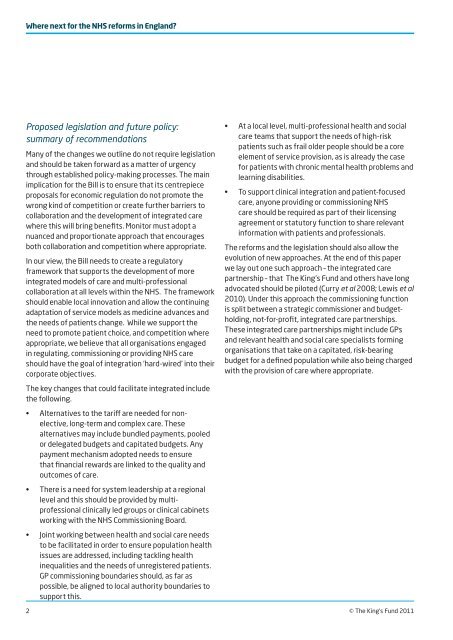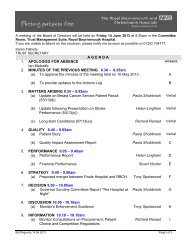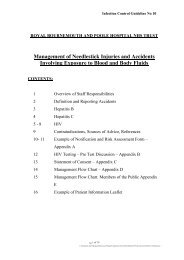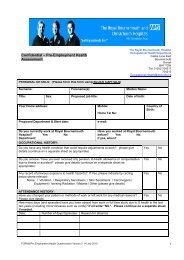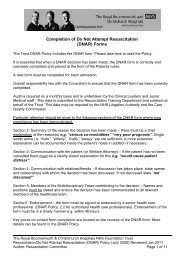View June's Board Pack - Royal Bournemouth Hospital
View June's Board Pack - Royal Bournemouth Hospital
View June's Board Pack - Royal Bournemouth Hospital
- No tags were found...
You also want an ePaper? Increase the reach of your titles
YUMPU automatically turns print PDFs into web optimized ePapers that Google loves.
Where next for the NHS reforms in England?Proposed legislation and future policy:summary of recommendationsMany of the changes we outline do not require legislationand should be taken forward as a matter of urgencythrough established policy-making processes. The mainimplication for the Bill is to ensure that its centrepieceproposals for economic regulation do not promote thewrong kind of competition or create further barriers tocollaboration and the development of integrated carewhere this will bring benefits. Monitor must adopt anuanced and proportionate approach that encouragesboth collaboration and competition where appropriate.In our view, the Bill needs to create a regulatoryframework that supports the development of moreintegrated models of care and multi-professionalcollaboration at all levels within the NHS. The frameworkshould enable local innovation and allow the continuingadaptation of service models as medicine advances andthe needs of patients change. While we support theneed to promote patient choice, and competition whereappropriate, we believe that all organisations engagedin regulating, commissioning or providing NHS careshould have the goal of integration ‘hard-wired’ into theircorporate objectives.The key changes that could facilitate integrated includethe following.• Alternatives to the tariff are needed for nonelective,long-term and complex care. Thesealternatives may include bundled payments, pooledor delegated budgets and capitated budgets. Anypayment mechanism adopted needs to ensurethat financial rewards are linked to the quality andoutcomes of care.• There is a need for system leadership at a regionallevel and this should be provided by multiprofessionalclinically led groups or clinical cabinetsworking with the NHS Commissioning <strong>Board</strong>.• Joint working between health and social care needsto be facilitated in order to ensure population healthissues are addressed, including tackling healthinequalities and the needs of unregistered patients.GP commissioning boundaries should, as far aspossible, be aligned to local authority boundaries tosupport this.• At a local level, multi-professional health and socialcare teams that support the needs of high-riskpatients such as frail older people should be a coreelement of service provision, as is already the casefor patients with chronic mental health problems andlearning disabilities.• To support clinical integration and patient-focusedcare, anyone providing or commissioning NHScare should be required as part of their licensingagreement or statutory function to share relevantinformation with patients and professionals.The reforms and the legislation should also allow theevolution of new approaches. At the end of this paperwe lay out one such approach – the integrated carepartnership – that The King’s Fund and others have longadvocated should be piloted (Curry et al 2008; Lewis et al2010). Under this approach the commissioning functionis split between a strategic commissioner and budgetholding,not-for-profit, integrated care partnerships.These integrated care partnerships might include GPsand relevant health and social care specialists formingorganisations that take on a capitated, risk-bearingbudget for a defined population while also being chargedwith the provision of care where appropriate.2 © The King’s Fund 2011


